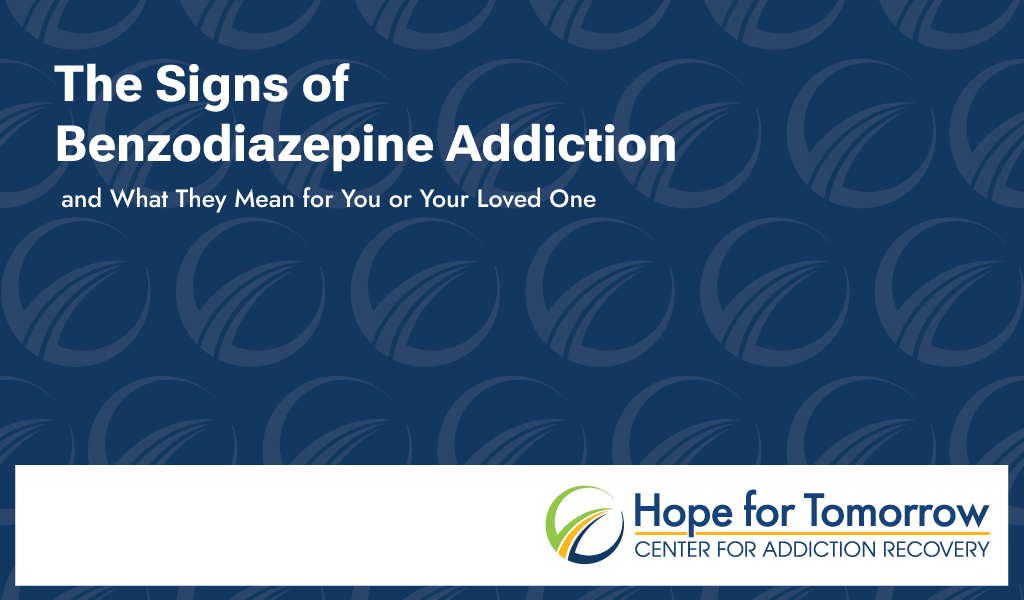

Could you spot the signs of benzodiazepine addiction in a loved one?
Benzodiazepines are one of the five most common contributors to drug overdoses. Having a benzodiazepine use disorder doesn’t guarantee someone will overdose, but it is an unfortunate and scary possibility. It’s especially possible if you mix benzodiazepines – benzos for short – with other substances, like alcohol or fentanyl.
Hope for Tomorrow works with people with all kinds of substance use disorders, from all walks of life. Some of our patients use benzodiazepines illicitly, and it was difficult for them to draw the line between addiction and taking their benzos as intended. Let’s go over the signs of benzodiazepine addiction, and provide some clarity for loved ones and people with a potential benzodiazepine use disorder.
Benzodiazepine use disorder can impact every area of a person’s life, from physical and mental health to their behavior and lifestyle. People using benzos outside their intended purpose usually show signs spanning every category.
Sometimes, the largest indicator of someone using benzos illicitly is how they act. People with benzodiazepine use disorders often:
If your loved one exhibits these behaviors, especially if they’re paired with physical and psychological symptoms, it’s worth talking to them about their benzodiazepine use.

Chronic benzodiazepine use is a slippery slope. Benzos are most frequently intended to be used in the short-term or on an “as-needed” basis. It’s vital for people who take benzodiazepines to remain in close contact with their doctor who prescribed them, and follow their directions closely. Otherwise, the chances of experiencing withdrawal or even overdosing on benzodiazepines increase.
Even people who take benzodiazepines as prescribed can experience withdrawal. Benzo withdrawal doesn’t necessarily indicate a benzodiazepine use disorder, and it can often be worked out between the patient and their doctor. Do not stop taking benzodiazepines, especially suddenly, without talking to a medical professional. Your doctor can help wean you off of your benzodiazepines so you can stop taking them without experiencing too many withdrawal symptoms.
That being said, if someone frequently exhibits benzodiazepine withdrawal symptoms, it could be an indication of a benzodiazepine use disorder. Here are signs of withdrawal to look out for:
The longer someone takes benzodiazepines, the more likely it is they’ll build up a tolerance to it. This means the person needs to take more of the medication to experience its original effects. People with benzodiazepine use disorder are most likely to develop a tolerance. If it’s not discussed with a doctor, taking a higher dose of benzodiazepines than prescribed can be dangerous, and possibly cause an overdose.
This is especially true for people who use other substances alongside their benzodiazepines, whether it’s alcohol, an interacting medication, or illicit drugs.
Unfortunately, the signs of a benzo overdose aren’t clear cut – they can vary from person to person. However, the most common symptoms of a benzodiazepine overdose include:

If you were wondering if your loved one has a benzodiazepine use disorder, maybe this article confirmed some of your suspicions. You might be wondering, “What now?”
There is treatment available, and benzodiazepine rehab will change your loved one’s life. It’s a hard step to take, but it’s well worth it. It might take time, but encourage the person you love to get help for their benzodiazepine use disorder. The help they need is here whenever they’re ready to accept it.
Hope for Tomorrow is an addiction recovery center with locations in Point Pleasant and Beckley, WV. We’re passionate about empowering people from all walks of life to completely conquer their substance use disorders. That means treating mental health and substance use disorders side by side for everyone – including veterans, pregnant women, and people with additional health conditions. We want to help you, too! Give us a call at 877-679-8162 today.
Treatment today for a brighter tomorrow.